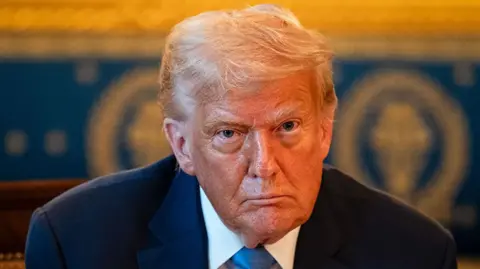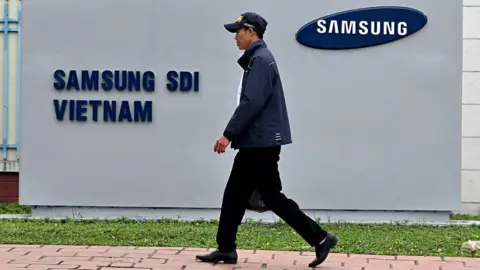
Asia is reeling but who is winning?
Business Reporter, BBC News

 Getty
GettyJapanese Prime Minister Shigeru Ishiba has described the latest rate threat of US President Donald Trump – 25% on Japanese goods.
Tokyo, a long -term associate, is trying to avoid it. While resisting the pressure of opening the market on American rice, it is looking for discounts for car makers in his career.
There have been many negotiations. When Trump announces rates against friends and enemies, Japanese Trade Minister has visited Washington DC at least seven times since April.
And yet, those trips seem to have a little fruit. Trump’s Tokyo’s label “Tuff” went from “damaged” as the discussion was dragged into the discussion.
And then this week, Japan joined the list of 23 nations who were sent a rate letter – 14 of them are in Asia. From South Korea to Sri Lanka, many people are an export-driven manufacturing hub.
Friday announced by Trump 35% rate for goods Import from Canada.
The President also said that he plans to raise the blanket rates from 10% to 20% on most trade partners and rejects the concern that the following charges can increase inflation.
“We are just saying that all the rest of the country is going to pay, then it is 5% or 5%. We will do this now,” he told the NBC News.
In countries around the world to contract with the United States till August 1. But they will be surprised for the reason that Japan, who is openly contracting with this staunch associate, has still faced a tall charge.
Trump The rate clock is reset again – again?? So who is winning and who is defeated?
Winner: Negotiations for more time
In a sense, almost all countries targeted by Trump at the beginning of this year have the benefit of the deadline – now they have three more weeks to deals.
“The optimistic case is that there is a pressure to participate in the next negotiations before the deadline of 1st August,” said Suan Take Kin of the United Oversius Bank Research.
Growing economies like Thailand and Malaysia, who have received rates of rates this week, will be eager to resolve the settlement, especially. Washington has targeted Chinese exports by third countries, which are known as transpiped goods.
Economists have told the BBC that there is a possibility of further expansion, considering the complexity of the trade agreement.
It is not completely clear that the countries will need time to implement Trump’s demands, which is going through the letters, said Alex Capri, a professional lecturer of Singapore’s National University.
For example, transcript goods have been especially charged as part of Vietnam’s trade agreement with Vietnam’s US. But it is unclear whether it is applied to the items created or all imported elements.
Either way, it will include more sophisticated technology to track the supply chains, ”said Shri Capri.
“It will be a slow, long -term and developing process with many third parties, tech companies and logistics partners.”
Defeated: Asian manufacturers
It is clear that the rates are here to stay, which causes the loss of global trade.
The global business companies in the US, Europe and China are in danger, Shri Capri said. It does not only hurt the exporters, But we also imported importers and customers??
And this is a shock for the financial ambitions of large parts of Asia, whose growth has increased from electronics to fabrics.

 Getty
GettyMr. Capri further said that it is foolish to have zero-bearing observations that the country are winning and defeated, because international trade, especially the US and China, is so deeply linked.
Some countries, however, may lose more than others.
Vietnam had signed the first agreement in Asia, but it did not benefit much against Washington and now has to face up to 40%. This is the same for Cambodia. A poor country depends strongly on exports, the agreement is underway due to Trump threatening 35% rates.
On the other hand, South Korea and Japan can last longer, as they are rich and the geographical-political levers are strong.
India has also taken advantage of itself, they have not yet been given a letter. A contract has come very close but The key appears to be late by the sticking pointsThe Indian agricultural market includes entry and imports of the country.
Defeated: US-Japan Alliance
“Despite the close economic and military relations with the United States, Japan is considered the same as other Asian trade partners,” said economist Jesper Cole.
And this relationship can change, especially Tokyo, with its large financial reserves, seems to be ready for long games.
“Japan has proved to be a harsh negotiation and I think it has suffered from Trump,” said Mr Kol.
Despite the lack of rice, prices are rising, Prime Minister Ishiba has refused to buy American rice by choosing to protect domestic farmers. His government has also refused to give the US demand to raise its military costs.

 Getty
Getty“They are well prepared,” Mr. Cole argued. He said that Trump announced the rate of financial emergency on the next day after Trump announced the rates in April and set up hundreds of consultation centers to help the affected companies.
He said, “Japan will search for a trusted agreement, because what is the guarantee that Trump will not change his opinion again?
This month, Japan’s upper house elections will be surprised if the agreement was agreed till August, Shri Kol said.
“No one is happy. But this is something that is going to force the recession in Japan? No.”
Winners: US or China?
Asia is seen as an important battlefield for Washington and Beijing long ago, and analysts say that Trump may be a Sidding ground due to rates.
One is, how complex these deals can be, some inspectors can cross their hands by extending the deadline again.
NUS Economics Professor David Jack said, “The US dealings have actually diminished because they have revealed that their hands are not as strong as they wish,” said NUS Economics Professor David Jack.
And the deals that are made can occur on the cost of trade change and the relationships built for more than decades.
Shri Capri, who described “political theater”, said Trump chose to post online letters instead of traditional diplomacy channels.
This confusion is a “great gift” to China, who is trying to portray himself as a stable alternative to Trump’s unpredictableness, he said.
But it is not easy to change the American market – and Beijing has a proper share of tension with countries in the world from Vietnam to Japan.
China is in the middle of its own trade negotiations with the United States, though it is longer to make the entire agreement until August 13.
So it is difficult to say who will win this trade war, but the race is still on.
“Both parties need divorce,” he said.












Post Comment